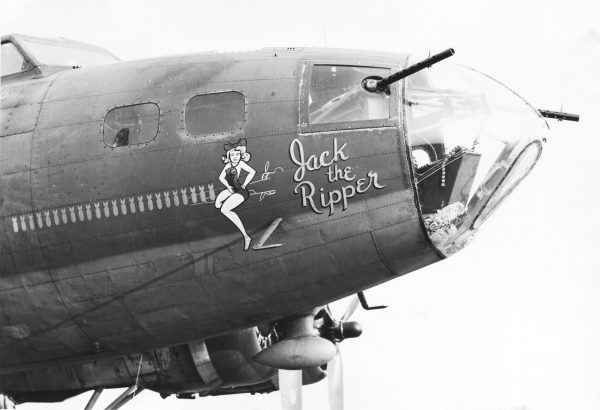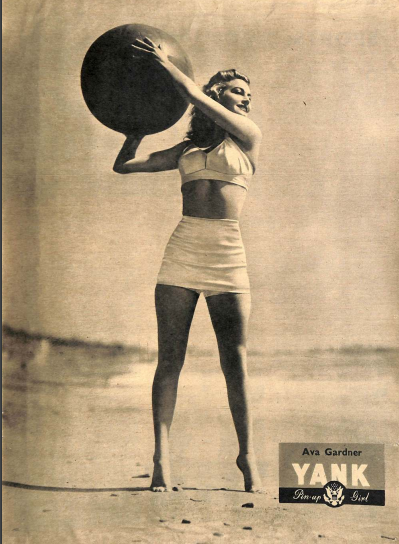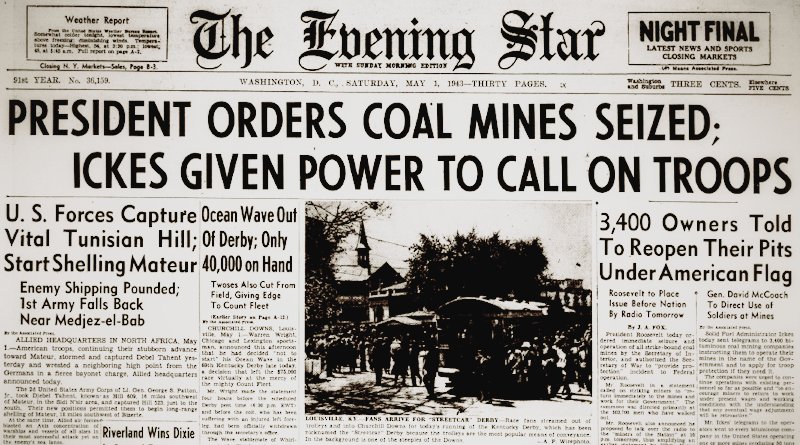World War II Chronicle: May 1, 1943
Click here for TODAY’S NEWSPAPER
Pictured on page two is the crew of the B-17 No. 41-24490 Jack the Ripper. This is the first Army Air Force B-17 crew to return intact after 25 combat missions. Their original bomber was lost by another crew after they flew home. The new Jack is one of the 2,750 Forts built under license by the Vega Aircraft Corp. in Burbank, Calif. These men were assigned to the 324th Bombing Squadron — the same outfit as another famous B-17 named Memphis Belle, which we will discuss soon.

Jack‘s pilot, Capt. William J. Crumm will transfer to the Pacific Theater next year and will ultimately become a major general in the Air Force. He is killed on July 7, 1967 when the B-52 he is riding in collides with another Stratofortress 20 miles off the coast of South Vietnam…
George Fielding Eliot column on page eight… Sports begins on page 12… “Torpedo 8” continues on page 17.
I didn’t see it in the Evening Star, but Yank, the Army Weekly held a contest to see who was the Army’s youngest master sergeant. The winner was 19-year-old Billy T. Hutson of Clinton, Tenn. According to his obituary Hutson lied about his age when he joined the National Guard and was actually 18. His prize was a train trip to Hollywood, where he got to dance with actress and Yank pinup gal Ava Gardner.

Hutson transferred to active duty before the war and now serves with the 959th Field Artillery Battalion. He will fight from Normandy to the Ardennes, earning five Bronze Star Medals along the way. The Library of Congress has a recording of an interview with Hutson here: https://www.loc.gov/item/afc2001001.26828/
Roving Reporter by Ernie Pyle
NORTHERN TUNISIA — One night at Kairouan three of us correspondents, finding the newly taken town filled with newly arrived British and American troops, just drove out of town into the country and camped for the night. We didn’t put up a tent. We just slept in the open.
The mosquitoes were fierce, and we draped netting over our heads.We were in a sort of big ditch right alongside an Arab graveyard. But neither the graves nor the mosquitoes bothered us that night, for we were tired and windburned, and before we knew it morning had come and a hot sun was beaming down into our squirming eyes.
And what should those sleepy eyes behold but two Arab boys standing right over our bedrolls, holding our eggs. It was practically like a New Yorker cartoon. For all I know they may have been standing there all night.
At any rate they had come to the right place, for we were definitely in the market for eggs. They wouldn’t sell for money, so we dug into our larder box and got four eggs in trade for three little celophane packets of hard candy. Then we started all over again and got four more eggs for a pack of cigarettes.
We thought it a good trade, but found later that the trading ration which the Germans had set up ahead of us was one cigaret for one egg. We Americans have to ruin everything, of course. But as one tough-looking soldier said:
“If I want to give $50 for an egg it’s my business and my $50. And from all I’ve seen of Arabs an extra franc or two ain’t gonna hurt them any.”
All this transpired before we had got out of our bedrolls. But the youthful traders didn’t leave. As we were putting on our pants each by whisked a shoeshine box from under his burnoose and went after our shoes. Then when we started a fire and were feeding it with sticks, one of the boys got down and blew on the flame to make it burn better. It was easy to see that we had acquired a couple of body servants.
The boys were herding about two dozen goats in some nearby clover. Now and then one of them would run over and chase the goats back nearer to our camp. We called one boy Mohammed and the other Abdullah, which seemed to tickle them. They were good-natured, happy boys of about 15.
One of them tried on my goggles. He seemed to imagine that he looked wonderful in them, and giggled and made poses. He didn’t know the goggles were upside down. Also he didn’t know that I was hoping fervently his eyes weren’t as diseased as they looked.
The boys told us in French that the Germans had made them work at an airport, opening gas cans and doing general flunky work. They said the Germans paid them about 20 francs a day, which is above the local scale, but they were German-printed francs, which of course are now absolutely worthless.
Our self-appointed helpers hunted sticks for us, poured water out of our big can and helped us wash our mess kits. They kept blowing in the fire, they cleaned up all the scraps around our bivouac, they lifted our heavy bedrolls into the jeep for us, and just as we were ready to leave they gave our shoes a final brushing.
We paid them with three cigarets and two sticks of gum each, and they were delighted.
When we were ready to go we shook hands all around, au-revoired, smiled and saluted. And then one of the boys asked apologetically if we could give them one more thing maybe. We asked what it was they wanted. You’d never guess. He wanted an empty tin can for his goats to chew on. We gave him one.
“Hadji” is the Arab word used in place of “Sir” before the name of anybody who has journeyed to Mecca and become holy. Seven journeys to the Kairouan equal one to Mecca, so we correspondents now go around calling each other Hadji, since most of us have crossed the city line more than seven times.
Another word we’ve adopted is “djebel.” It’s Arabic for hill or mountain. On the maps every knob you see is Djebel This or Djebel That. So we also call each other Djebel, and if you think that’s silly, well, we have to have something to laugh at.
Evening star. (Washington, D.C.), 1 May 1943. Chronicling America: Historic American Newspapers. Lib. of Congress.
https://chroniclingamerica.loc.gov/lccn/sn83045462/1943-05-01/ed-1/
